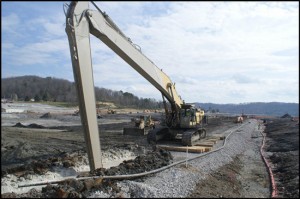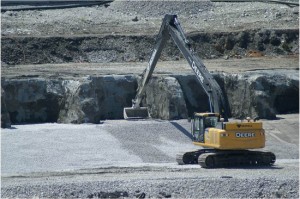KINGSTON—The Tennessee Valley Authority has achieved a significant milestone in its cleanup of the ash spill at the Kingston Fossil Plant—the completion of an earthquake-resistant, underground retaining wall around the containment cell at the recovery site.
The wall, which completely surrounds the 240-acre containment cell where recovered ash will be permanently stored, was completed on Feb. 20, almost a month ahead of schedule.
“I’m extremely proud of the project team for accomplishing this major undertaking,†said Bob Deacy, TVA senior vice president of projects. “They kept safety at the forefront and completed this significant milestone ahead of schedule.â€
Construction of the wall began in summer 2011. Two high-capacity, long-reach hydraulic excavators dug trenches that were 4 feet wide and reached depths between 40 and 70 feet. More than 200,000 tons of cement and other materials were used to construct the wall, which is embedded 70 feet into the bedrock.
It is the largest wall of its kind in the U.S. at nearly 64,000 linear feet, the equivalent of 12 miles, and is designed to withstand a magnitude 6.0 earthquake.
“Construction of the wall is an impressive engineering achievement,†said Craig Zeller, the U.S. Environmental Protection Agency’s on-site administrator. “While slurry wall technology has been used by the environmental protection industry for many years, the application at TVA’s Kingston site is very unique due to the complex, seismic design; construction techniques; comprehensive geotechnical quality control requirements, and overall size of the wall.â€
The project team is now focused on completing installation of the cap and cover over the reinforced containment cell. The project remains under budget and on schedule to be completed by the end of this year.
In addition, TVA is restoring and enhancing the Swan Pond area by installing several recreational features, performing shoreline stabilization, constructing wetlands, and planting a variety of native plants and trees. When this work is completed in spring 2015, there will be more than three miles of paved walking trails, fishing piers and docks, a pedestrian bridge and boat ramp, and wildlife habitat areas for the public to enjoy.
Following the Kingston ash spill, TVA inspected and evaluated all of its coal ash facilities and developed a comprehensive plan for closing out wet storage of ash and gypsum at its coal-fired plants and installing state-of-the-art dry storage systems. The plan, which was presented to the TVA Board in 2009, is expected to cost $1.5 billion to $2 billion and is currently scheduled to be completed by December 2022. TVA has already invested $500 million to complete the process at Kingston and to begin work at Bull Run, another TVA fossil plant in eastern Tennessee.
“TVA remains committed to completing our wet-to-dry conversion program and closing wet storage facilities,†Deacy said.
See the last Oak Ridge Today story on the ash spill cleanup here.







Leave a Reply